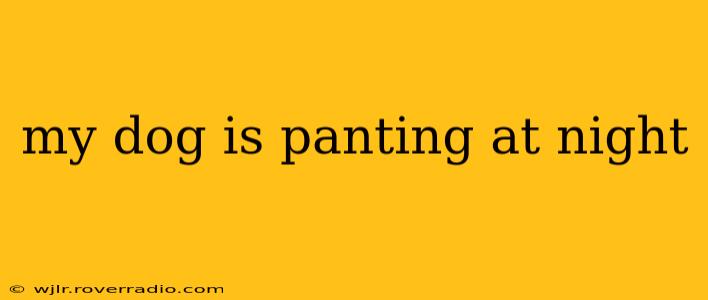Is your furry friend keeping you up at night with excessive panting? While occasional panting is normal, persistent nighttime panting in dogs can signal a variety of underlying issues, ranging from simple discomfort to serious medical conditions. This comprehensive guide will help you understand the potential causes, when to seek veterinary attention, and how to best support your canine companion.
Why is My Dog Panting at Night?
Nighttime panting in dogs can stem from several factors. It's crucial to consider your dog's breed, age, overall health, and recent activities to determine the root cause. Common reasons include:
-
Overheating: Even in cooler temperatures, your dog might overheat if they're sleeping in a poorly ventilated area, have thick fur, or are brachycephalic (short-nosed) breeds like Bulldogs or Pugs. These breeds are particularly prone to overheating.
-
Stress or Anxiety: Dogs can experience anxiety just like humans. Separation anxiety, fear of thunderstorms, or even a change in routine can manifest as nighttime panting. Look for other signs of anxiety, such as restlessness, pacing, or whining.
-
Pain: Pain, whether from injury, arthritis, or another underlying condition, can cause increased panting. Observe your dog for other signs of discomfort, like limping, stiffness, or changes in behavior.
-
Underlying Medical Conditions: Various medical conditions can cause increased panting. These include heart disease, respiratory problems (such as pneumonia or bronchitis), kidney disease, and hyperthyroidism.
-
Medications: Certain medications can have panting as a side effect. Check your dog's medication list and consult with your veterinarian if you suspect a medication is causing the panting.
Is My Dog Panting Too Much at Night?
Determining whether your dog's panting is excessive requires careful observation. Consider the following:
- Frequency: How often is your dog panting? Is it a constant pant or occasional gasps?
- Intensity: How heavily is your dog panting? Is it shallow breathing or rapid, labored breaths?
- Context: Is the panting accompanied by other symptoms like restlessness, lethargy, coughing, vomiting, or diarrhea?
- Duration: How long has the panting been occurring?
If the panting is excessive, persistent, accompanied by other symptoms, or a sudden change from their normal behavior, it's crucial to seek veterinary attention immediately.
What Should I Do if My Dog is Panting Heavily at Night?
First, try to identify any potential triggers. Ensure your dog has a cool, comfortable sleeping area, is not overexerted, and is feeling safe and secure. Provide fresh water and check for any signs of injury or discomfort.
When Should I Take My Dog to the Vet for Panting?
You should consult a veterinarian if:
- Panting is excessive or persistent.
- Panting is accompanied by other symptoms like lethargy, coughing, vomiting, or diarrhea.
- Your dog's panting is sudden and a significant change from their normal behavior.
- Your dog seems distressed or in pain.
- Your dog is a brachycephalic breed and is panting heavily.
Don't hesitate to seek professional veterinary help if you're concerned about your dog's panting. Early diagnosis and treatment can make a significant difference in your dog's health and well-being.
Can I Give My Dog Anything to Help with Panting?
Do not attempt to treat your dog's panting with over-the-counter medications or home remedies without consulting your veterinarian first. Some remedies can be harmful to your pet. Your vet can determine the underlying cause and recommend appropriate treatment.
My Dog's Panting is Caused by Anxiety – What Can I Do?
For anxiety-related panting, several strategies can help:
- Create a calming environment: Ensure a comfortable, safe, and quiet sleeping space for your dog. Use calming aids like pheromone diffusers or calming treats as directed by your veterinarian.
- Routine and predictability: Maintain a consistent daily routine to reduce anxiety triggers.
- Exercise: Regular exercise can help reduce stress and anxiety.
- Training: Positive reinforcement training can help manage anxiety. Consult a certified professional dog trainer for guidance.
Remember, your dog's health is paramount. By carefully observing your dog and seeking veterinary attention when necessary, you can ensure your furry friend receives the proper care and support they need.
